Detailed Analysis of Recovery Focused Mental Health Nursing
VerifiedAdded on 2021/05/30
|9
|1575
|46
Report
AI Summary
This report provides a comprehensive overview of recovery-focused mental health nursing. It defines the practice as a person-centered approach that prioritizes the client's needs and active participation in their treatment. The report outlines the three pillars of recovery-focused mental health nursing: hope, person-centered care, and consideration of the service user's perspective. It emphasizes the importance of hope in the recovery process, the need for individualized care that considers the client's beliefs and culture, and the value of incorporating the client's perspective on their condition and treatment. The report also details the purpose and principles of recovery-focused mental health nursing, including the uniqueness of the individual, the importance of choices, dignity, respect, partnership, communication, and the protection of client rights. Finally, the report explores the creative aspects of this nursing practice, likening it to a tree where self-determination is the stem, and hope, knowledge, and other factors are the branches that support the client's journey to recovery.
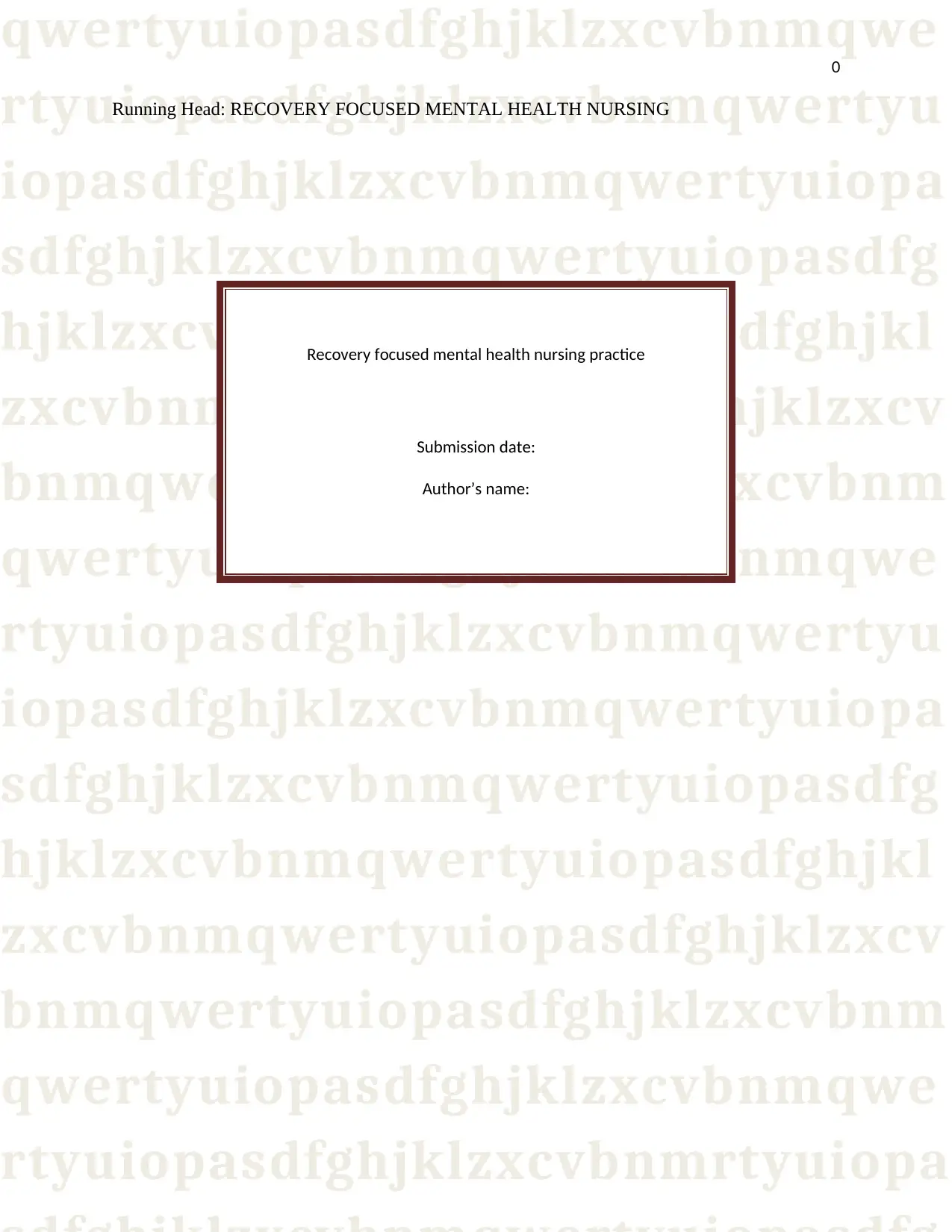
qwertyuiopasdfghjklzxcvbnmqwe
rtyuiopasdfghjklzxcvbnmqwertyu
iopasdfghjklzxcvbnmqwertyuiopa
sdfghjklzxcvbnmqwertyuiopasdfg
hjklzxcvbnmqwertyuiopasdfghjkl
zxcvbnmqwertyuiopasdfghjklzxcv
bnmqwertyuiopasdfghjklzxcvbnm
qwertyuiopasdfghjklzxcvbnmqwe
rtyuiopasdfghjklzxcvbnmqwertyu
iopasdfghjklzxcvbnmqwertyuiopa
sdfghjklzxcvbnmqwertyuiopasdfg
hjklzxcvbnmqwertyuiopasdfghjkl
zxcvbnmqwertyuiopasdfghjklzxcv
bnmqwertyuiopasdfghjklzxcvbnm
qwertyuiopasdfghjklzxcvbnmqwe
rtyuiopasdfghjklzxcvbnmrtyuiopa
0
Running Head: RECOVERY FOCUSED MENTAL HEALTH NURSING
Recovery focused mental health nursing practice
Submission date:
Author’s name:
rtyuiopasdfghjklzxcvbnmqwertyu
iopasdfghjklzxcvbnmqwertyuiopa
sdfghjklzxcvbnmqwertyuiopasdfg
hjklzxcvbnmqwertyuiopasdfghjkl
zxcvbnmqwertyuiopasdfghjklzxcv
bnmqwertyuiopasdfghjklzxcvbnm
qwertyuiopasdfghjklzxcvbnmqwe
rtyuiopasdfghjklzxcvbnmqwertyu
iopasdfghjklzxcvbnmqwertyuiopa
sdfghjklzxcvbnmqwertyuiopasdfg
hjklzxcvbnmqwertyuiopasdfghjkl
zxcvbnmqwertyuiopasdfghjklzxcv
bnmqwertyuiopasdfghjklzxcvbnm
qwertyuiopasdfghjklzxcvbnmqwe
rtyuiopasdfghjklzxcvbnmrtyuiopa
0
Running Head: RECOVERY FOCUSED MENTAL HEALTH NURSING
Recovery focused mental health nursing practice
Submission date:
Author’s name:
Paraphrase This Document
Need a fresh take? Get an instant paraphrase of this document with our AI Paraphraser
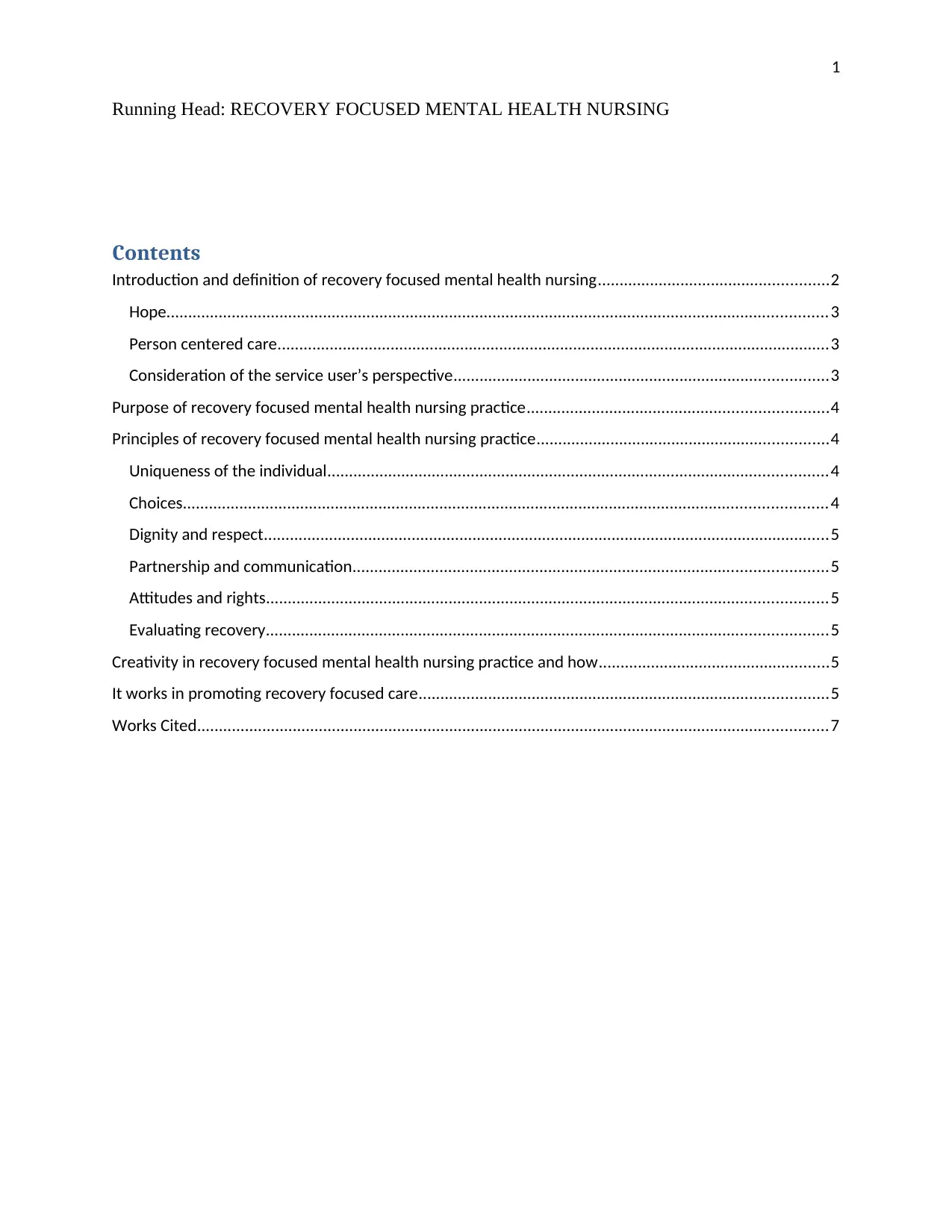
1
Running Head: RECOVERY FOCUSED MENTAL HEALTH NURSING
Contents
Introduction and definition of recovery focused mental health nursing.....................................................2
Hope........................................................................................................................................................3
Person centered care...............................................................................................................................3
Consideration of the service user’s perspective......................................................................................3
Purpose of recovery focused mental health nursing practice.....................................................................4
Principles of recovery focused mental health nursing practice...................................................................4
Uniqueness of the individual...................................................................................................................4
Choices....................................................................................................................................................4
Dignity and respect..................................................................................................................................5
Partnership and communication.............................................................................................................5
Attitudes and rights.................................................................................................................................5
Evaluating recovery.................................................................................................................................5
Creativity in recovery focused mental health nursing practice and how.....................................................5
It works in promoting recovery focused care..............................................................................................5
Works Cited.................................................................................................................................................7
Running Head: RECOVERY FOCUSED MENTAL HEALTH NURSING
Contents
Introduction and definition of recovery focused mental health nursing.....................................................2
Hope........................................................................................................................................................3
Person centered care...............................................................................................................................3
Consideration of the service user’s perspective......................................................................................3
Purpose of recovery focused mental health nursing practice.....................................................................4
Principles of recovery focused mental health nursing practice...................................................................4
Uniqueness of the individual...................................................................................................................4
Choices....................................................................................................................................................4
Dignity and respect..................................................................................................................................5
Partnership and communication.............................................................................................................5
Attitudes and rights.................................................................................................................................5
Evaluating recovery.................................................................................................................................5
Creativity in recovery focused mental health nursing practice and how.....................................................5
It works in promoting recovery focused care..............................................................................................5
Works Cited.................................................................................................................................................7
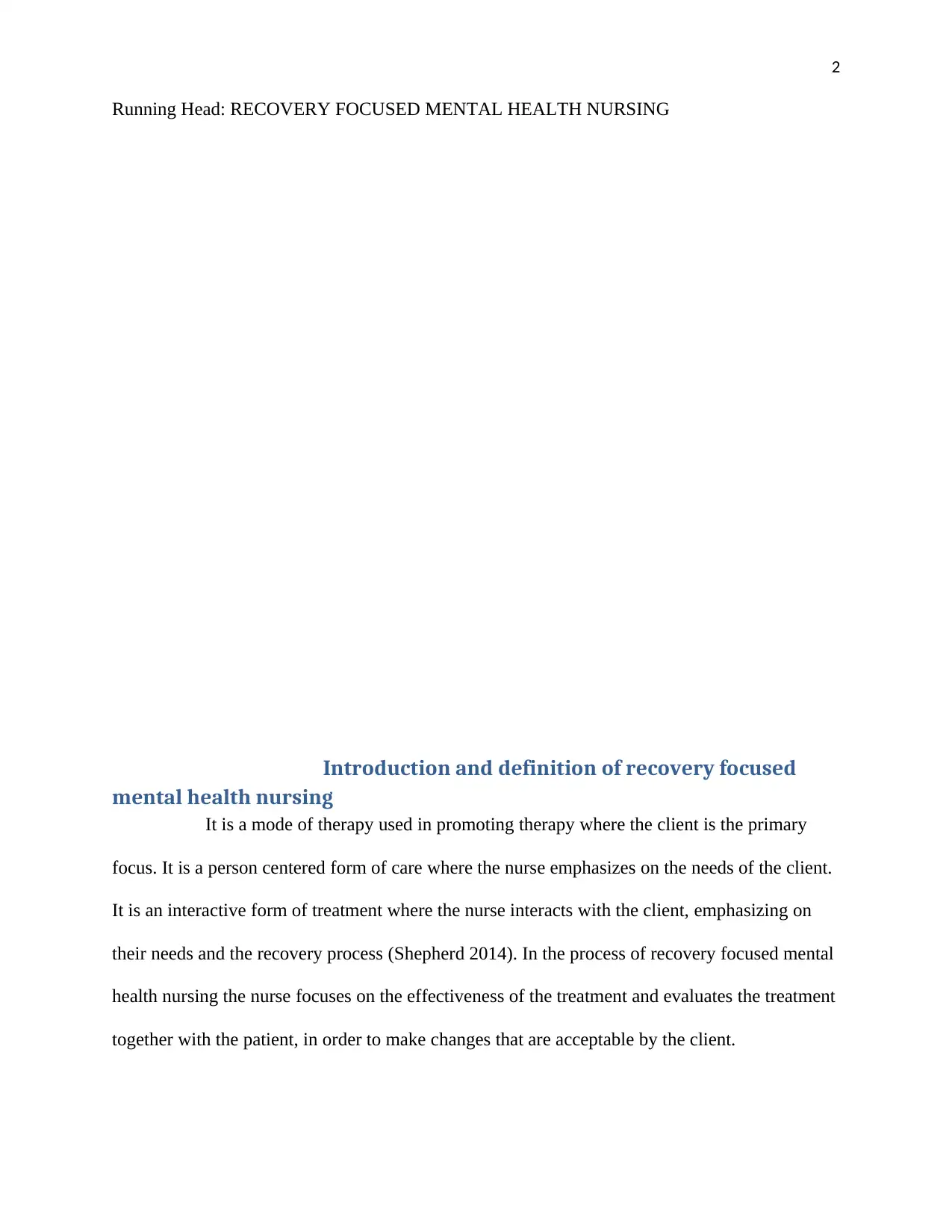
2
Running Head: RECOVERY FOCUSED MENTAL HEALTH NURSING
Introduction and definition of recovery focused
mental health nursing
It is a mode of therapy used in promoting therapy where the client is the primary
focus. It is a person centered form of care where the nurse emphasizes on the needs of the client.
It is an interactive form of treatment where the nurse interacts with the client, emphasizing on
their needs and the recovery process (Shepherd 2014). In the process of recovery focused mental
health nursing the nurse focuses on the effectiveness of the treatment and evaluates the treatment
together with the patient, in order to make changes that are acceptable by the client.
Running Head: RECOVERY FOCUSED MENTAL HEALTH NURSING
Introduction and definition of recovery focused
mental health nursing
It is a mode of therapy used in promoting therapy where the client is the primary
focus. It is a person centered form of care where the nurse emphasizes on the needs of the client.
It is an interactive form of treatment where the nurse interacts with the client, emphasizing on
their needs and the recovery process (Shepherd 2014). In the process of recovery focused mental
health nursing the nurse focuses on the effectiveness of the treatment and evaluates the treatment
together with the patient, in order to make changes that are acceptable by the client.
⊘ This is a preview!⊘
Do you want full access?
Subscribe today to unlock all pages.

Trusted by 1+ million students worldwide
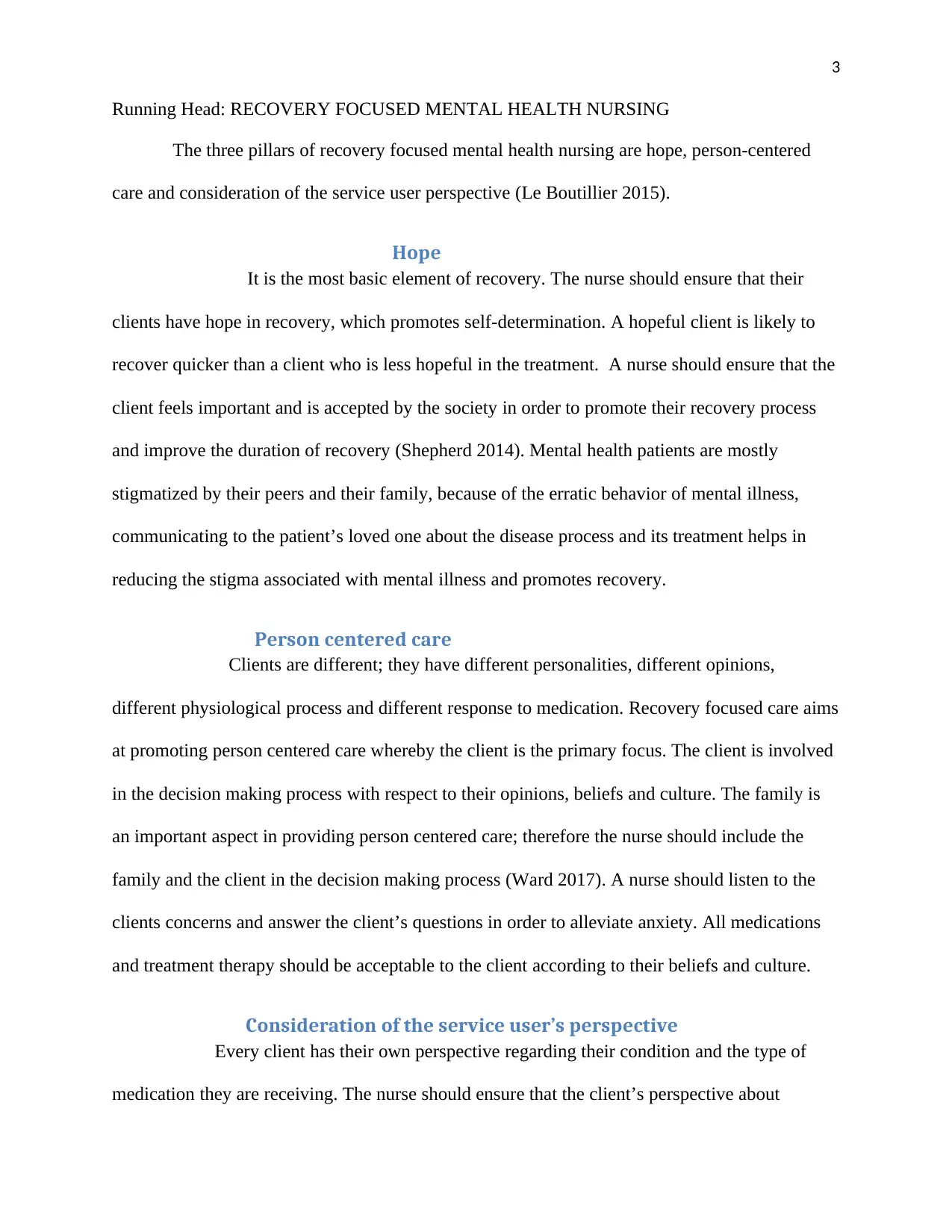
3
Running Head: RECOVERY FOCUSED MENTAL HEALTH NURSING
The three pillars of recovery focused mental health nursing are hope, person-centered
care and consideration of the service user perspective (Le Boutillier 2015).
Hope
It is the most basic element of recovery. The nurse should ensure that their
clients have hope in recovery, which promotes self-determination. A hopeful client is likely to
recover quicker than a client who is less hopeful in the treatment. A nurse should ensure that the
client feels important and is accepted by the society in order to promote their recovery process
and improve the duration of recovery (Shepherd 2014). Mental health patients are mostly
stigmatized by their peers and their family, because of the erratic behavior of mental illness,
communicating to the patient’s loved one about the disease process and its treatment helps in
reducing the stigma associated with mental illness and promotes recovery.
Person centered care
Clients are different; they have different personalities, different opinions,
different physiological process and different response to medication. Recovery focused care aims
at promoting person centered care whereby the client is the primary focus. The client is involved
in the decision making process with respect to their opinions, beliefs and culture. The family is
an important aspect in providing person centered care; therefore the nurse should include the
family and the client in the decision making process (Ward 2017). A nurse should listen to the
clients concerns and answer the client’s questions in order to alleviate anxiety. All medications
and treatment therapy should be acceptable to the client according to their beliefs and culture.
Consideration of the service user’s perspective
Every client has their own perspective regarding their condition and the type of
medication they are receiving. The nurse should ensure that the client’s perspective about
Running Head: RECOVERY FOCUSED MENTAL HEALTH NURSING
The three pillars of recovery focused mental health nursing are hope, person-centered
care and consideration of the service user perspective (Le Boutillier 2015).
Hope
It is the most basic element of recovery. The nurse should ensure that their
clients have hope in recovery, which promotes self-determination. A hopeful client is likely to
recover quicker than a client who is less hopeful in the treatment. A nurse should ensure that the
client feels important and is accepted by the society in order to promote their recovery process
and improve the duration of recovery (Shepherd 2014). Mental health patients are mostly
stigmatized by their peers and their family, because of the erratic behavior of mental illness,
communicating to the patient’s loved one about the disease process and its treatment helps in
reducing the stigma associated with mental illness and promotes recovery.
Person centered care
Clients are different; they have different personalities, different opinions,
different physiological process and different response to medication. Recovery focused care aims
at promoting person centered care whereby the client is the primary focus. The client is involved
in the decision making process with respect to their opinions, beliefs and culture. The family is
an important aspect in providing person centered care; therefore the nurse should include the
family and the client in the decision making process (Ward 2017). A nurse should listen to the
clients concerns and answer the client’s questions in order to alleviate anxiety. All medications
and treatment therapy should be acceptable to the client according to their beliefs and culture.
Consideration of the service user’s perspective
Every client has their own perspective regarding their condition and the type of
medication they are receiving. The nurse should ensure that the client’s perspective about
Paraphrase This Document
Need a fresh take? Get an instant paraphrase of this document with our AI Paraphraser
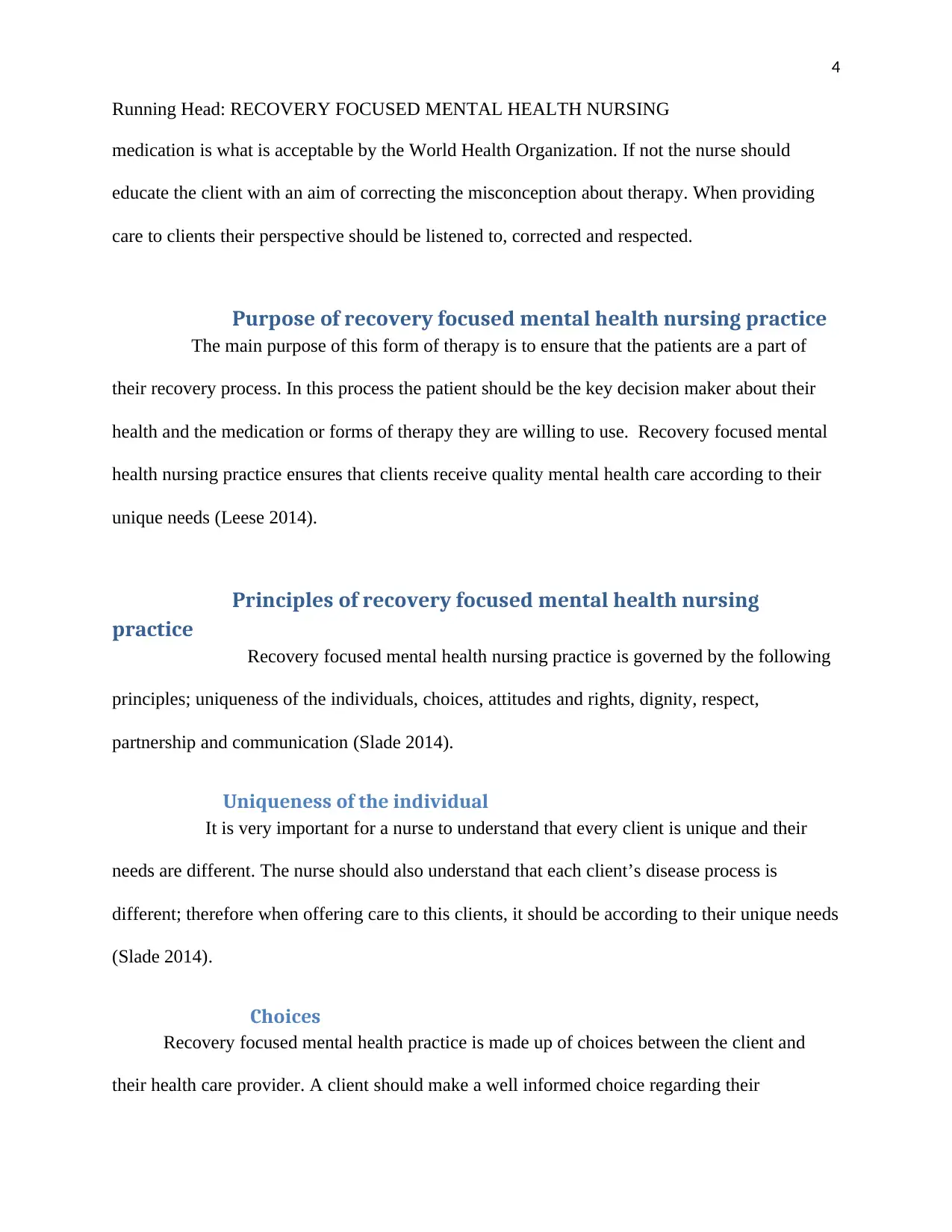
4
Running Head: RECOVERY FOCUSED MENTAL HEALTH NURSING
medication is what is acceptable by the World Health Organization. If not the nurse should
educate the client with an aim of correcting the misconception about therapy. When providing
care to clients their perspective should be listened to, corrected and respected.
Purpose of recovery focused mental health nursing practice
The main purpose of this form of therapy is to ensure that the patients are a part of
their recovery process. In this process the patient should be the key decision maker about their
health and the medication or forms of therapy they are willing to use. Recovery focused mental
health nursing practice ensures that clients receive quality mental health care according to their
unique needs (Leese 2014).
Principles of recovery focused mental health nursing
practice
Recovery focused mental health nursing practice is governed by the following
principles; uniqueness of the individuals, choices, attitudes and rights, dignity, respect,
partnership and communication (Slade 2014).
Uniqueness of the individual
It is very important for a nurse to understand that every client is unique and their
needs are different. The nurse should also understand that each client’s disease process is
different; therefore when offering care to this clients, it should be according to their unique needs
(Slade 2014).
Choices
Recovery focused mental health practice is made up of choices between the client and
their health care provider. A client should make a well informed choice regarding their
Running Head: RECOVERY FOCUSED MENTAL HEALTH NURSING
medication is what is acceptable by the World Health Organization. If not the nurse should
educate the client with an aim of correcting the misconception about therapy. When providing
care to clients their perspective should be listened to, corrected and respected.
Purpose of recovery focused mental health nursing practice
The main purpose of this form of therapy is to ensure that the patients are a part of
their recovery process. In this process the patient should be the key decision maker about their
health and the medication or forms of therapy they are willing to use. Recovery focused mental
health nursing practice ensures that clients receive quality mental health care according to their
unique needs (Leese 2014).
Principles of recovery focused mental health nursing
practice
Recovery focused mental health nursing practice is governed by the following
principles; uniqueness of the individuals, choices, attitudes and rights, dignity, respect,
partnership and communication (Slade 2014).
Uniqueness of the individual
It is very important for a nurse to understand that every client is unique and their
needs are different. The nurse should also understand that each client’s disease process is
different; therefore when offering care to this clients, it should be according to their unique needs
(Slade 2014).
Choices
Recovery focused mental health practice is made up of choices between the client and
their health care provider. A client should make a well informed choice regarding their
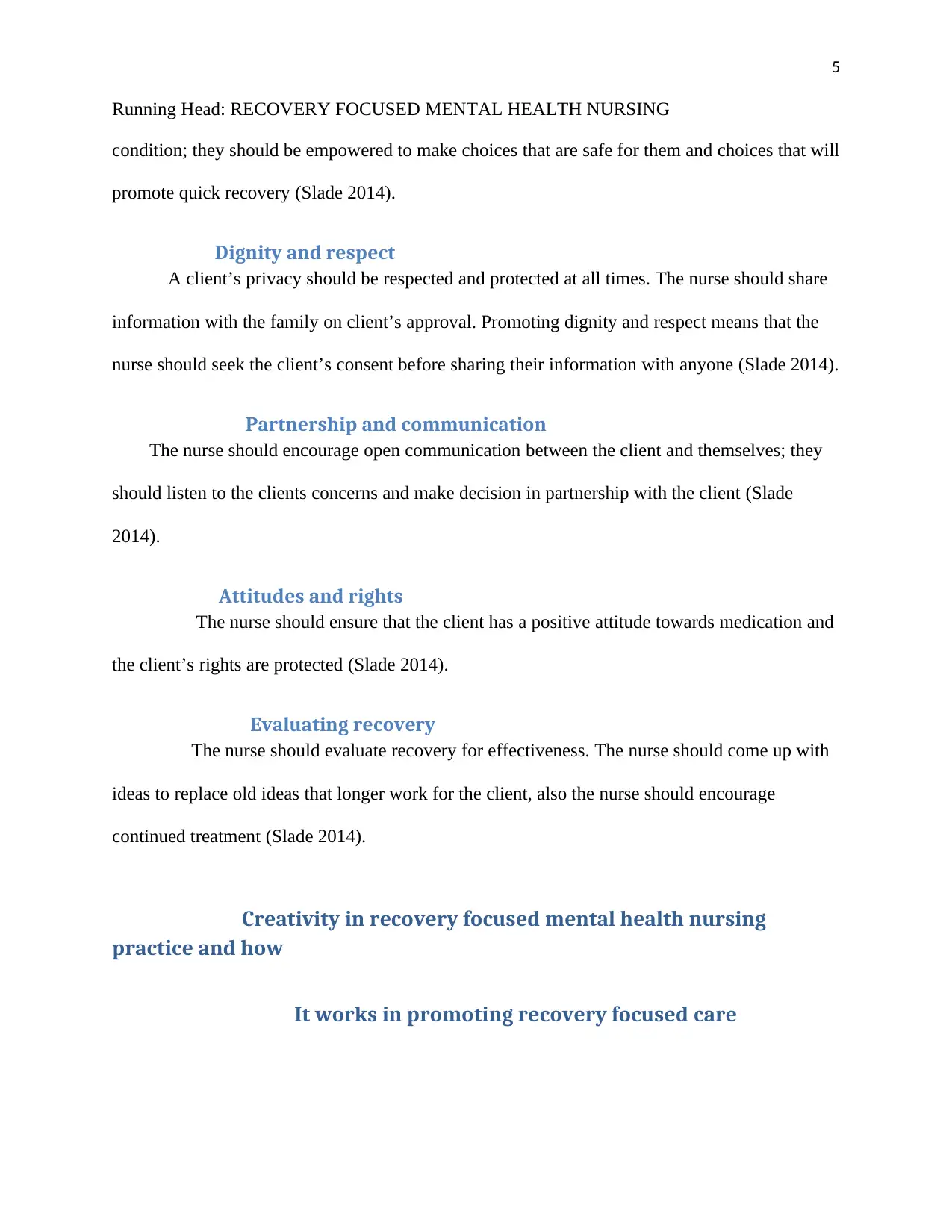
5
Running Head: RECOVERY FOCUSED MENTAL HEALTH NURSING
condition; they should be empowered to make choices that are safe for them and choices that will
promote quick recovery (Slade 2014).
Dignity and respect
A client’s privacy should be respected and protected at all times. The nurse should share
information with the family on client’s approval. Promoting dignity and respect means that the
nurse should seek the client’s consent before sharing their information with anyone (Slade 2014).
Partnership and communication
The nurse should encourage open communication between the client and themselves; they
should listen to the clients concerns and make decision in partnership with the client (Slade
2014).
Attitudes and rights
The nurse should ensure that the client has a positive attitude towards medication and
the client’s rights are protected (Slade 2014).
Evaluating recovery
The nurse should evaluate recovery for effectiveness. The nurse should come up with
ideas to replace old ideas that longer work for the client, also the nurse should encourage
continued treatment (Slade 2014).
Creativity in recovery focused mental health nursing
practice and how
It works in promoting recovery focused care
Running Head: RECOVERY FOCUSED MENTAL HEALTH NURSING
condition; they should be empowered to make choices that are safe for them and choices that will
promote quick recovery (Slade 2014).
Dignity and respect
A client’s privacy should be respected and protected at all times. The nurse should share
information with the family on client’s approval. Promoting dignity and respect means that the
nurse should seek the client’s consent before sharing their information with anyone (Slade 2014).
Partnership and communication
The nurse should encourage open communication between the client and themselves; they
should listen to the clients concerns and make decision in partnership with the client (Slade
2014).
Attitudes and rights
The nurse should ensure that the client has a positive attitude towards medication and
the client’s rights are protected (Slade 2014).
Evaluating recovery
The nurse should evaluate recovery for effectiveness. The nurse should come up with
ideas to replace old ideas that longer work for the client, also the nurse should encourage
continued treatment (Slade 2014).
Creativity in recovery focused mental health nursing
practice and how
It works in promoting recovery focused care
⊘ This is a preview!⊘
Do you want full access?
Subscribe today to unlock all pages.

Trusted by 1+ million students worldwide
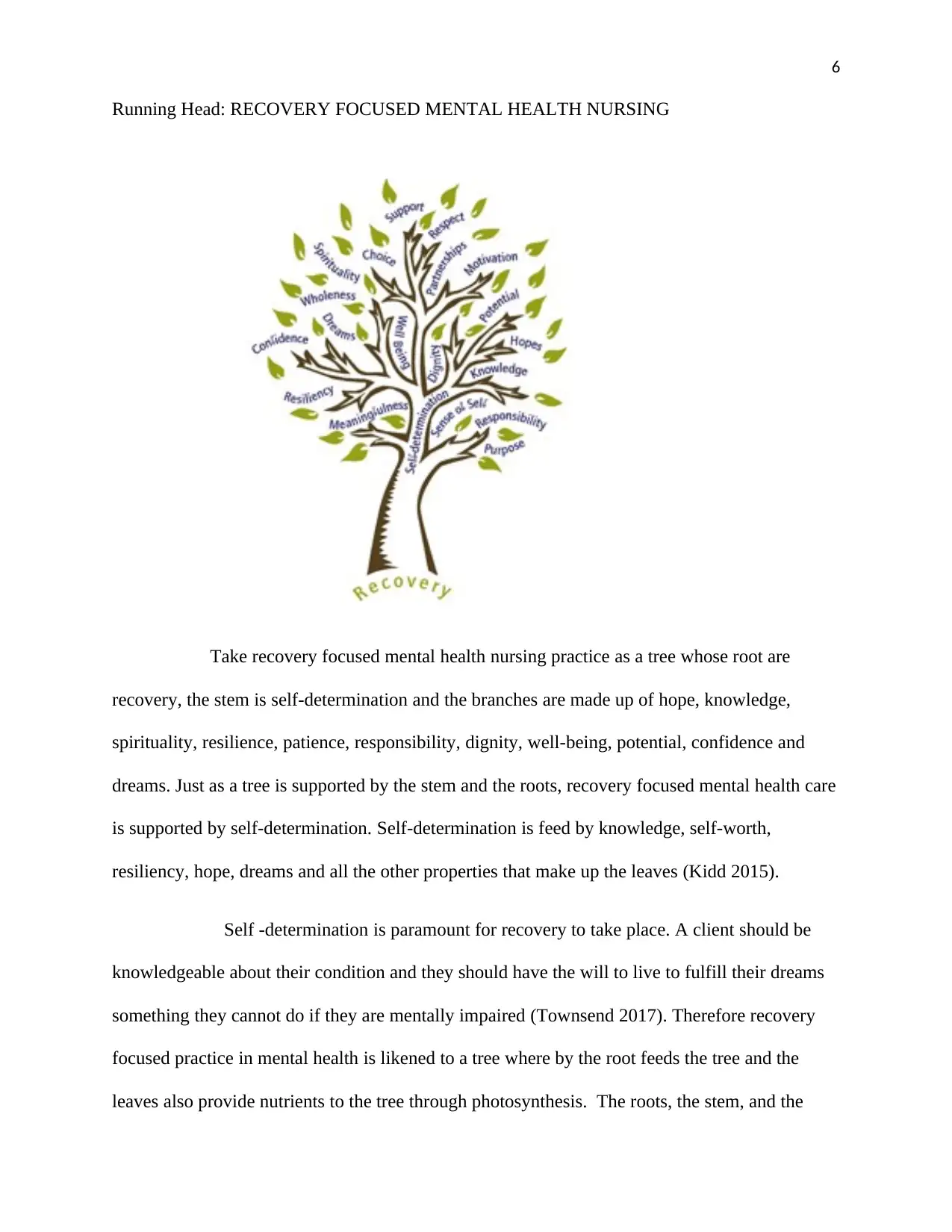
6
Running Head: RECOVERY FOCUSED MENTAL HEALTH NURSING
Take recovery focused mental health nursing practice as a tree whose root are
recovery, the stem is self-determination and the branches are made up of hope, knowledge,
spirituality, resilience, patience, responsibility, dignity, well-being, potential, confidence and
dreams. Just as a tree is supported by the stem and the roots, recovery focused mental health care
is supported by self-determination. Self-determination is feed by knowledge, self-worth,
resiliency, hope, dreams and all the other properties that make up the leaves (Kidd 2015).
Self -determination is paramount for recovery to take place. A client should be
knowledgeable about their condition and they should have the will to live to fulfill their dreams
something they cannot do if they are mentally impaired (Townsend 2017). Therefore recovery
focused practice in mental health is likened to a tree where by the root feeds the tree and the
leaves also provide nutrients to the tree through photosynthesis. The roots, the stem, and the
Running Head: RECOVERY FOCUSED MENTAL HEALTH NURSING
Take recovery focused mental health nursing practice as a tree whose root are
recovery, the stem is self-determination and the branches are made up of hope, knowledge,
spirituality, resilience, patience, responsibility, dignity, well-being, potential, confidence and
dreams. Just as a tree is supported by the stem and the roots, recovery focused mental health care
is supported by self-determination. Self-determination is feed by knowledge, self-worth,
resiliency, hope, dreams and all the other properties that make up the leaves (Kidd 2015).
Self -determination is paramount for recovery to take place. A client should be
knowledgeable about their condition and they should have the will to live to fulfill their dreams
something they cannot do if they are mentally impaired (Townsend 2017). Therefore recovery
focused practice in mental health is likened to a tree where by the root feeds the tree and the
leaves also provide nutrients to the tree through photosynthesis. The roots, the stem, and the
Paraphrase This Document
Need a fresh take? Get an instant paraphrase of this document with our AI Paraphraser
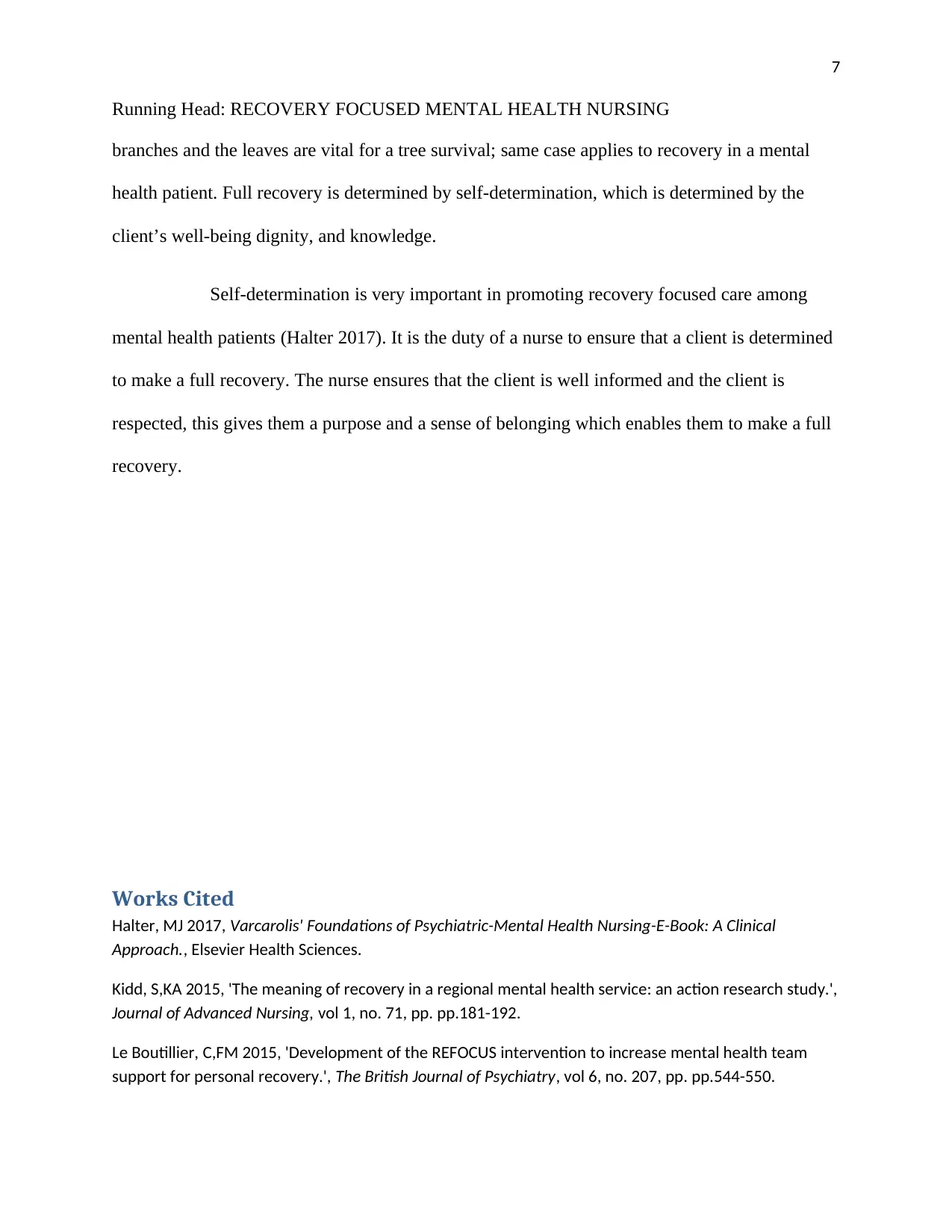
7
Running Head: RECOVERY FOCUSED MENTAL HEALTH NURSING
branches and the leaves are vital for a tree survival; same case applies to recovery in a mental
health patient. Full recovery is determined by self-determination, which is determined by the
client’s well-being dignity, and knowledge.
Self-determination is very important in promoting recovery focused care among
mental health patients (Halter 2017). It is the duty of a nurse to ensure that a client is determined
to make a full recovery. The nurse ensures that the client is well informed and the client is
respected, this gives them a purpose and a sense of belonging which enables them to make a full
recovery.
Works Cited
Halter, MJ 2017, Varcarolis' Foundations of Psychiatric-Mental Health Nursing-E-Book: A Clinical
Approach., Elsevier Health Sciences.
Kidd, S,KA 2015, 'The meaning of recovery in a regional mental health service: an action research study.',
Journal of Advanced Nursing, vol 1, no. 71, pp. pp.181-192.
Le Boutillier, C,FM 2015, 'Development of the REFOCUS intervention to increase mental health team
support for personal recovery.', The British Journal of Psychiatry, vol 6, no. 207, pp. pp.544-550.
Running Head: RECOVERY FOCUSED MENTAL HEALTH NURSING
branches and the leaves are vital for a tree survival; same case applies to recovery in a mental
health patient. Full recovery is determined by self-determination, which is determined by the
client’s well-being dignity, and knowledge.
Self-determination is very important in promoting recovery focused care among
mental health patients (Halter 2017). It is the duty of a nurse to ensure that a client is determined
to make a full recovery. The nurse ensures that the client is well informed and the client is
respected, this gives them a purpose and a sense of belonging which enables them to make a full
recovery.
Works Cited
Halter, MJ 2017, Varcarolis' Foundations of Psychiatric-Mental Health Nursing-E-Book: A Clinical
Approach., Elsevier Health Sciences.
Kidd, S,KA 2015, 'The meaning of recovery in a regional mental health service: an action research study.',
Journal of Advanced Nursing, vol 1, no. 71, pp. pp.181-192.
Le Boutillier, C,FM 2015, 'Development of the REFOCUS intervention to increase mental health team
support for personal recovery.', The British Journal of Psychiatry, vol 6, no. 207, pp. pp.544-550.
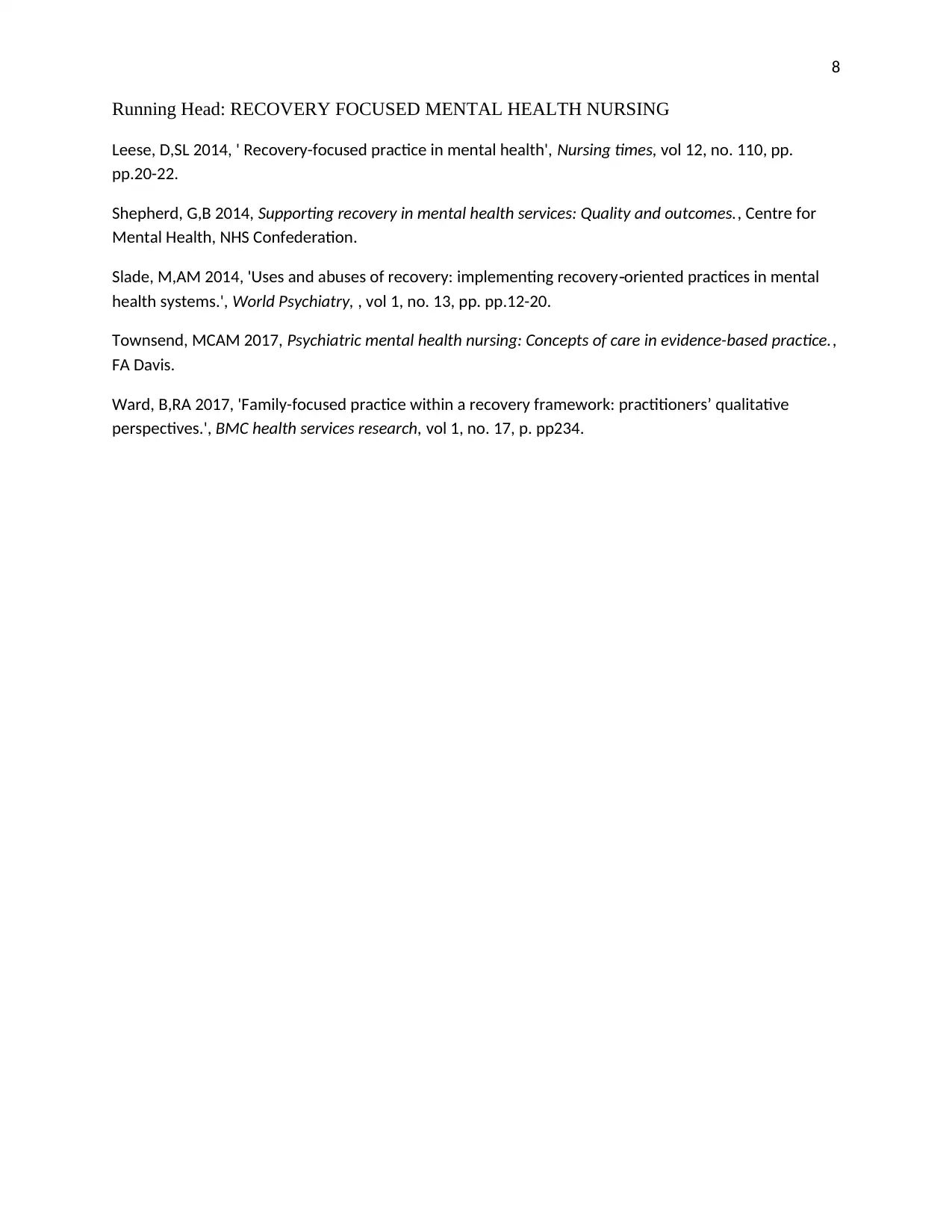
8
Running Head: RECOVERY FOCUSED MENTAL HEALTH NURSING
Leese, D,SL 2014, ' Recovery-focused practice in mental health', Nursing times, vol 12, no. 110, pp.
pp.20-22.
Shepherd, G,B 2014, Supporting recovery in mental health services: Quality and outcomes., Centre for
Mental Health, NHS Confederation.
Slade, M,AM 2014, 'Uses and abuses of recovery: implementing recovery oriented practices in mental‐
health systems.', World Psychiatry, , vol 1, no. 13, pp. pp.12-20.
Townsend, MCAM 2017, Psychiatric mental health nursing: Concepts of care in evidence-based practice.,
FA Davis.
Ward, B,RA 2017, 'Family-focused practice within a recovery framework: practitioners’ qualitative
perspectives.', BMC health services research, vol 1, no. 17, p. pp234.
Running Head: RECOVERY FOCUSED MENTAL HEALTH NURSING
Leese, D,SL 2014, ' Recovery-focused practice in mental health', Nursing times, vol 12, no. 110, pp.
pp.20-22.
Shepherd, G,B 2014, Supporting recovery in mental health services: Quality and outcomes., Centre for
Mental Health, NHS Confederation.
Slade, M,AM 2014, 'Uses and abuses of recovery: implementing recovery oriented practices in mental‐
health systems.', World Psychiatry, , vol 1, no. 13, pp. pp.12-20.
Townsend, MCAM 2017, Psychiatric mental health nursing: Concepts of care in evidence-based practice.,
FA Davis.
Ward, B,RA 2017, 'Family-focused practice within a recovery framework: practitioners’ qualitative
perspectives.', BMC health services research, vol 1, no. 17, p. pp234.
⊘ This is a preview!⊘
Do you want full access?
Subscribe today to unlock all pages.

Trusted by 1+ million students worldwide
1 out of 9
Related Documents
Your All-in-One AI-Powered Toolkit for Academic Success.
+13062052269
info@desklib.com
Available 24*7 on WhatsApp / Email
![[object Object]](/_next/static/media/star-bottom.7253800d.svg)
Unlock your academic potential
Copyright © 2020–2026 A2Z Services. All Rights Reserved. Developed and managed by ZUCOL.





